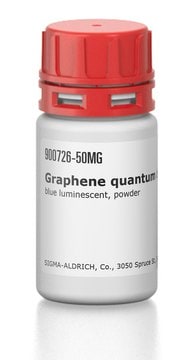900748
Perovskite quantum dots
oleic acid and oleylamine coated, fluorescence λem 450 nm, 10 mg/mL in toluene
Synonym(s):
Cadmium free QDs, Fluorescent nanocrystals, Perovskite nanocrystals, QDs
About This Item
Recommended Products
Looking for similar products? Visit Product Comparison Guide
Related Categories
Application
Perovskite quantum dots (QDs) of common formula CsPbX3 (X = Cl, Br, I) possess high photoluminescence efficiency and narrow emission and emit in the visible spectral regime. Perovskite QDs are cadmium free and the aforementioned properties render them suitable for applications in light emitting diodes (LEDs), lasers, liquid crystal displays (LCDs) etc.
Signal Word
Danger
Hazard Statements
Precautionary Statements
Hazard Classifications
Aquatic Chronic 2 - Asp. Tox. 1 - Flam. Liq. 2 - Repr. 1A - Skin Irrit. 2 - STOT RE 2 - STOT SE 3
Target Organs
Central nervous system
Storage Class Code
3 - Flammable liquids
WGK
WGK 3
Flash Point(F)
48.2 °F
Flash Point(C)
9 °C
Certificates of Analysis (COA)
Search for Certificates of Analysis (COA) by entering the products Lot/Batch Number. Lot and Batch Numbers can be found on a product’s label following the words ‘Lot’ or ‘Batch’.
Already Own This Product?
Find documentation for the products that you have recently purchased in the Document Library.
Customers Also Viewed
Articles
In this article, the properties of some of the new non-cadmium based QDs along with different applications of QDs are summarized.
Professor Sharma and colleagues review the synthesis and applications of this novel material. This includes a discussion of the unique properties of quantum dots and their suitability for solar cell applications, along with common synthesis techniques used to develop these materials.
Professor Xiaohu Gao (University of Washington, USA) provides a overview of recent quantum dot (QD) advancements and their potential for advancing bioassay and bioimaging technologies.
Colloidal quantum dots (QDs) are solution-processable luminescent materials that can produce high-quality color in light emitting diodes (LEDs).
Our team of scientists has experience in all areas of research including Life Science, Material Science, Chemical Synthesis, Chromatography, Analytical and many others.
Contact Technical Service





